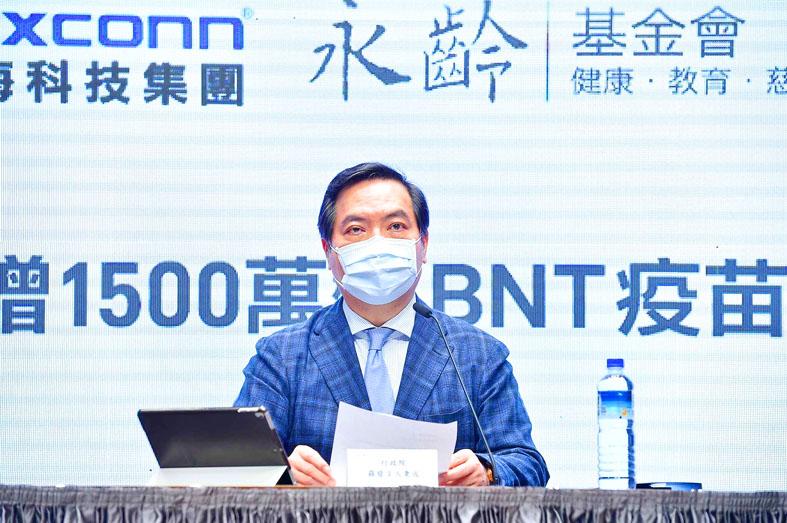The Buddhist Compassion Relief Tzu Chi Foundation yesterday signed a contract with Shanghai Fosun Pharmaceutical Group Co (上海復星醫藥集團) to purchase 5 million doses of BioNTech’s COVID-19 vaccine, the Executive Yuan said.
Shanghai Fosun is the German company’s agent for distributing COVID-19 vaccines in Taiwan and China, including Hong Kong and Macau.
At about 8am, the foundation submitted documents to the Centers for Disease Control (CDC) to be reviewed, Executive Yuan spokesman Lo Ping-cheng (羅秉成) told a news conference in the afternoon.

Photo courtesy of the Executive Yuan
At about 10am, CDC Director-General Chou Jih-haw (周志浩) signed a contract with the foundation regarding its plan to donate the BioNTech vaccines to the government, Lo said.
In terms of donation principles, the contract framework and conditions, the government’s deal with the foundation is the same as its agreements with Taiwan Semiconductor Manufacturing Co (TSMC, 台積電) and the Hon Hai Precision Industry Co (鴻海精密)-affiliated Yonglin Foundation, Lo said.
The vaccines would be delivered by BioNTech to Taiwan directly and items would not be labeled with the vaccine’s Chinese name, Comirnaty (復必泰), sources familiar with the matter said.
The vaccines procured by the three entities would arrive before the end of September, the sources said, adding that the unit prices for each are similar.
The special project of the Executive Yuan allowed the entities to procure a combined 15 million doses, 5 million each, from the German firm, which is to deliver them in several shipments, Lo said.
The BioNTech vaccines would be distributed via the government’s online COVID-19 vaccination booking system when they become available, he said.
The CDC would apply for emergency use authorization permits from the Food and Drug Administration to import and use the vaccines, Lo said.
People aged 12 to 18 have been approved to receive shots of the BioNTech vaccine, he said.
Asked about difficulties with the Tzu Chi foundation’s application, Lo said that it filed its proposal with the ministry on June 23, but the Executive Yuan initially did not give its approval, as it was tackling the TSMC and YongLin Foundation applications.
After deliberation, the Executive Yuan on July 1 also established a special project for the Tzu Chi foundation’s plan, he said.
The CDC on July 9 signed documents with the Tzu Chi foundation for vaccine procurement, he said.
The Executive Yuan completed the procedure in one month because it used the same model as the other two projects, he said.

INVESTIGATION: The case is the latest instance of a DPP figure being implicated in an espionage network accused of allegedly leaking information to Chinese intelligence Democratic Progressive Party (DPP) member Ho Jen-chieh (何仁傑) was detained and held incommunicado yesterday on suspicion of spying for China during his tenure as assistant to then-minister of foreign affairs Joseph Wu (吳釗燮). The Taipei District Prosecutors’ Office said Ho was implicated during its investigation into alleged spying activities by former Presidential Office consultant Wu Shang-yu (吳尚雨). Prosecutors said there is reason to believe Ho breached the National Security Act (國家安全法) by leaking classified Ministry of Foreign Affairs information to Chinese intelligence. Following interrogation, prosecutors petitioned the Taipei District Court to detain Ho, citing concerns over potential collusion or tampering of evidence. The

Seventy percent of middle and elementary schools now conduct English classes entirely in English, the Ministry of Education said, as it encourages schools nationwide to adopt this practice Minister of Education (MOE) Cheng Ying-yao (鄭英耀) is scheduled to present a report on the government’s bilingual education policy to the Legislative Yuan’s Education and Culture Committee today. The report would outline strategies aimed at expanding access to education, reducing regional disparities and improving talent cultivation. Implementation of bilingual education policies has varied across local governments, occasionally drawing public criticism. For example, some schools have required teachers of non-English subjects to pass English proficiency

‘FORM OF PROTEST’: The German Institute Taipei said it was ‘shocked’ to see Nazi symbolism used in connection with political aims as it condemned the incident Sung Chien-liang (宋建樑), who led efforts to recall Democratic Progressive Party (DPP) Legislator Lee Kun-cheng (李坤城), was released on bail of NT$80,000 yesterday amid an outcry over a Nazi armband he wore to questioning the night before. Sung arrived at the New Taipei City District Prosecutors’ Office for questioning in a recall petition forgery case on Tuesday night wearing a red armband bearing a swastika, carrying a copy of Adolf Hitler’s Mein Kampf and giving a Nazi salute. Sung left the building at 1:15am without the armband and apparently covering the book with a coat. This is a serious international scandal and Chinese

NEGOTIATIONS: The US response to the countermeasures and plans Taiwan presented has been positive, including boosting procurement and investment, the president said Taiwan is included in the first group for trade negotiations with the US, President William Lai (賴清德) said yesterday, as he seeks to shield Taiwanese exporters from a 32 percent tariff. In Washington, US Trade Representative Jamieson Greer said in an interview on Fox News on Thursday that he would speak to his Taiwanese and Israeli counterparts yesterday about tariffs after holding a long discussion with the Vietnamese earlier. US President Donald Trump on Wednesday postponed punishing levies on multiple trade partners, including Taiwan, for three months after trillions of US dollars were wiped off global markets. He has maintained a 10 percent